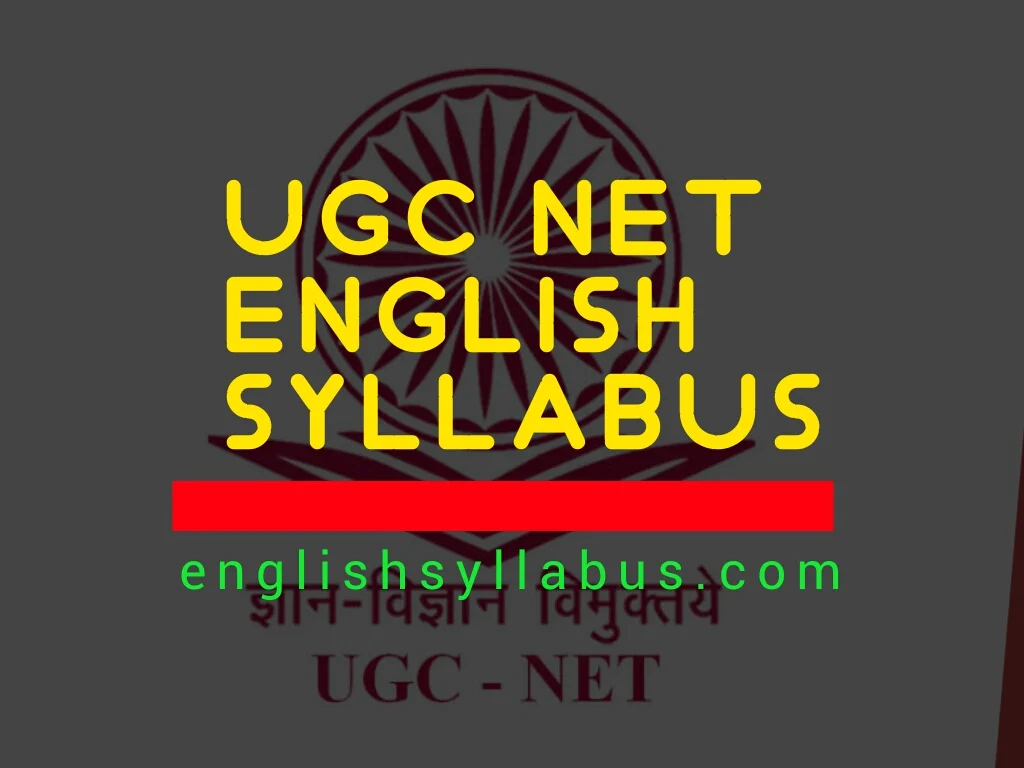The University Grants Commission National Eligibility Test (UGC NET) in English is a highly competitive examination conducted by the National Testing Agency (NTA) to determine the eligibility of candidates for Assistant Professorship or Junior Research Fellowship in various universities and colleges across India. The syllabus for UGC NET English is vast and covers a wide range of topics related to literature, language, and critical theory.
UGC NET English Syllabus Two Papers
- Paper I
- Paper II
Paper I is common for all subjects, while Paper II is subject-specific. Here are the key features of the UGC NET English Syllabus:
Key Features of the UGC NET English Syllabus
- The syllabus covers a wide range of topics related to literature, language, and critical theory.
- The UGC NET English Syllabus is divided into two papers: Paper I and Paper II.
- Paper I is common for all subjects and is designed to test the teaching and research aptitude of the candidate.
- Paper II is subject-specific and covers topics such as literary criticism and theory, language and linguistics, and cultural studies, among others.
- The syllabus includes literary works from different periods of English literature, including Chaucer, Shakespeare, Milton, Wordsworth, Eliot, and many others.
- Candidates are expected to have a strong command of the language, critical thinking skills, and a thorough understanding of the literary and theoretical concepts covered in the syllabus.
- The UGC NET English Syllabus is regularly updated to keep pace with the changing trends in literature and critical theory.
- The syllabus includes topics related to research methodology, research ethics, and digital initiatives in higher education, among others, to ensure that candidates are well-equipped to pursue research and teaching careers in the field of English literature.
- The UGC NET English examination is highly competitive, and candidates need to prepare thoroughly by covering all the topics listed in the syllabus.
- The UGC NET English Syllabus is an essential tool for candidates preparing for the examination and serves as a guide for their preparation.
UGC NET English Syllabus Papers
Paper 1
Paper 1 is designed to test the teaching and research aptitude of the candidate. It consists of 50 multiple-choice questions, each carrying two marks. The duration of the examination is one hour.
The following topics are covered in Paper I:
- Teaching Aptitude: Teaching methodology, Teaching aids, Evaluation systems, etc.
- Research Aptitude: Research ethics, Research process, and methodology, Research designs, etc.
- Reading Comprehension: Understanding and interpreting the text, critical reasoning, and vocabulary.
- Communication: Communication techniques, Effective classroom communication, etc.
- Reasoning (including Mathematical): Analytical reasoning, Logical reasoning, Number series, etc.
- Logical Reasoning: Syllogism, Blood relation, matrix-type questions, etc.
- Data Interpretation: Basic concepts of statistics, Graphical representation of data, etc.
- Information and Communication Technology (ICT): Digital initiatives in higher education, etc.
- People and Environment: Environmental pollution, Biodiversity, conservation, etc.
| Paper I | Topics Covered |
|---|---|
| Teaching Aptitude | Teaching methodology, Teaching aids, Evaluation systems, etc. |
| Research Aptitude | Syllogism, Blood relation, matrix-type questions, etc. |
| Reading Comprehension | Understanding and interpreting the text, critical reasoning, and vocabulary. |
| Communication | Communication techniques, Effective classroom communication, etc. |
| Reasoning (including Mathematical) | Analytical reasoning, Logical reasoning, Number series, etc. |
| Logical Reasoning | Research ethics, Research process, and methodology, Research designs, etc. |
| Data Interpretation | Basic concepts of statistics, Graphical representation of data, etc. |
| Information and Communication Technology (ICT) | Digital initiatives in higher education, etc. |
| People and Environment | Syllogism, Blood relation, matrix type questions, etc. |
Download UGC NET English Syllabus Pdf
Paper 2
Paper II: Paper 2 consists of 100 multiple-choice questions, each carrying two marks. The duration of the examination is two hours. The following topics are covered in Paper II:
- Literary Criticism and Theory: Formalism, Structuralism, Deconstruction, Feminism, Postcolonialism, etc.
- Chaucer to Shakespeare: Chaucer, Spenser, Shakespeare, etc.
- Jacobean to Restoration Periods: Donne, Jonson, Milton, etc.
- Augustan Age: Pope, Swift, Addison, Johnson, etc.
- Romantic Period: Wordsworth, Coleridge, Shelley, Keats, etc.
- Victorian Period: Tennyson, Browning, Arnold, etc.
- Modern and Contemporary Periods: Eliot, Yeats, Auden, Beckett, etc.
- American and Other Non-British Literature: Emerson, Whitman, Faulkner, etc.
- Literary Terms and Concepts: Poetics, Semiotics, Narratology, etc.
- Cultural Studies: Cultural Theory, Postmodernism, Globalization, etc.
- Language and Linguistics: Grammar, Syntax, Semantics, Pragmatics, etc.
| Paper II | Topics Covered |
|---|---|
| Literary Criticism and Theory | Formalism, Structuralism, Deconstruction, Feminism, Postcolonialism, etc. |
| Chaucer to Shakespeare | Chaucer, Spenser, Shakespeare, etc. |
| Jacobean to Restoration Periods | Donne, Jonson, Milton, etc. |
| Augustan Age | Pope, Swift, Addison, Johnson, etc. |
| Romantic Period | Wordsworth, Coleridge, Shelley, Keats, etc. |
| Victorian Period | Tennyson, Browning, Arnold, etc. |
| Modern and Contemporary Periods | Eliot, Yeats, Auden, Beckett, etc. |
| American and Other Non-British Literature | Emerson, Whitman, Faulkner, etc. |
| Literary Terms and Concepts | Poetics, Semiotics, Narratology, etc. |
| Cultural Studies | Cultural theory, Postmodernism, Globalization, etc. |
| Language and Linguistics | Grammar, Syntax, Semantics, Pragmatics, etc. |
In conclusion, the UGC NET English Syllabus is designed to test the knowledge and understanding of literature, language, and critical theory, as well as teaching and research aptitude. Candidates who wish to appear for the UGC NET English examination must have a strong command of the language, critical thinking skills, and a thorough understanding of the literary and theoretical concepts covered in the syllabus.

